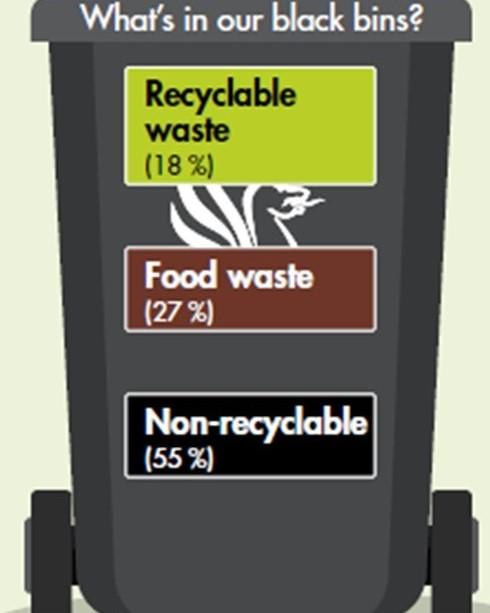Following an extensive public consultation earlier this year, final proposals for the new services have now been agreed and will be introduced in phases in 2025, in a bid to reduce waste, boost recycling rates and cut costs.
North Somerset Council introduced weekly kerbside recycling collections of a wide range of materials including food waste in 2010. However, an analysis of the waste North Somerset households put in their black bins found that almost half (45 per cent) could have been recycled.
The changes to help North Somerset households recycle more include the introduction of a kerbside collection of soft plastics (such as crisp packets and vegetable packaging) and switching from a fortnightly to a three-weekly collection of non-recyclable (black bin) rubbish.
In addition, a trial of a new recycling container will be conducted over the coming months and training for NSEC collection crews will be refreshed to address issues highlighted in the consultation, such as littering and placement of returned containers.
A team of waste minimisation officers will be available to advise people who may have concerns and need more support to recycle as much as they can. People who may struggle with a three-weekly black bin collection due to medical needs, children in disposable nappies or a larger household will also receive additional support. If necessary, a slightly different solution could be put in place for that household.
Cllr Annemieke Waite, North Somerset Council’s executive member for waste, said: "These changes will deliver three key benefits. They will cut the cost to council taxpayers of waste disposal. They will boost further our recycling rates, which are already amongst the best, and introduce kerbside recycling of soft plastics. The plans will also provide additional support to households least able to manage their waste, including advice and bigger bins where that is needed.
“This year, we will need to spend around £5 million to dispose of black bin rubbish, but almost half of this waste could instead be recycled and generate an income to help pay for vital local services.
“North Somerset residents already do a lot of hard work to recycle but it’s important we do more. Not only will that save council tax payers’ money, it will also help protect our environment.”
Treating and disposing of black bin rubbish costs local council tax payers around £130 per tonne. North Somerset Council’s separated kerbside recycling collections result in a high quality of recycling material, which can be sold and made into new materials. This generates an income of around £30 per tonne.
Last year households in North Somerset generated a total of approximately 90,000 tonnes of waste, 40,000 tonnes of which was put in black bins. 18,000 tonnes of this could have been recycled instead, helping our environment and saving money.
The changes to waste and recycling collection services are in line with North Somerset Council’s ambitious recycling and waste strategy targets. The new collections will generate an estimated saving of £1.1m a year thanks to a combination of reduced costs of black bin rubbish disposal as well as an increase in revenue from the sale of the additional recyclable materials collected, which will help fund other vital council services.
The frequency of other recycling and waste collections will remain unchanged, with weekly collections of food waste and recycling, plus an optional chargeable regular garden waste service.
The new service will not be suitable for certain properties in North Somerset which already have slightly different collection arrangements in place. These households will be notified if they are to remain on their current collection service.
Several other local councils in the south west have already successfully made the switch to three-weekly non-recyclable rubbish collections, including Somerset, East Devon, and Mid-Devon. All have seen a reduction in non-recyclable waste, an increase in recycling rates and a financial saving.
